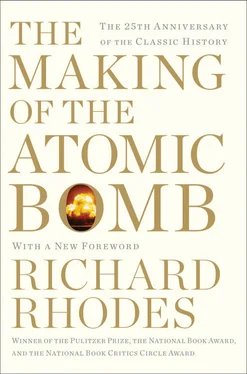And should we come to such disaster, would we still believe the weapons keep us safe? Would we see their possession then for what it is now, a crime against humanity? Would we wish we had done the hard work of abolishing them, everywhere in the world?
I have studied and written about nuclear history now for more than thirty years. What I take away from this long venture, most of all, is a sense of awe at the depth and power of the natural world, and a fascination with the complexities and the ironies of our species’ continuing encounter with technology. Despite everything, across these past seven decades—nearly the length of my life—we have managed to take into our clumsy hands a limitless new source of energy, hold it, examine it, turn it over, heft it, and put it to work without yet blowing ourselves up. When we finally make our way across to the other shore—when all the nuclear weapons have been dismantled and their cores blended down for reactor fuel—we will find ourselves facing much the same political insecurities we face now. The bombs didn’t fix them and they won’t be fixed by putting the bombs away. The world will be a more transparent place, to be sure, but information technology is moving it in that direction anyway. The difference, as Jonathan Schell has pointed out, will be that the threat of rearming will serve for deterrence rather than the threat of nuclear war.
I think of a world without nuclear weapons not as a utopian dream but simply as a world where delivery times have been deliberately lengthened to months or even years, with correspondingly longer periods interim during which to resolve disputes short of war. In such a world, if negotiations fail, if conventional skirmishes fail, if both sides revert to arming themselves with nuclear weapons again—then at worst we will only arrive once more at the dangerous precipice where we all stand now.
The discovery of how to release nuclear energy, like all fundamental scientific discoveries, changed the structure of human affairs—permanently.
How that happened is the story this book attempts to tell.
—Richard Rhodes
Half Moon Bay
February 2012
PART ONE
PROFOUND AND NECESSARY TRUTH
It is a profound and necessary truth that the deep things in science are not found because they are useful; they are found because it was possible to find them.
Robert Oppenheimer
It is still an unending source of surprise for me to see how a few scribbles on a blackboard or on a sheet of paper could change the course of human affairs.
Stanislaw Ulam
In London, where Southampton Row passes Russell Square, across from the British Museum in Bloomsbury, Leo Szilard waited irritably one gray Depression morning for the stoplight to change. A trace of rain had fallen during the night; Tuesday, September 12, 1933, dawned cool, humid and dull. 1Drizzling rain would begin again in early afternoon. When Szilard told the story later he never mentioned his destination that morning. He may have had none; he often walked to think. In any case another destination intervened. The stoplight changed to green. Szilard stepped off the curb. As he crossed the street time cracked open before him and he saw a way to the future, death into the world and all our woe, the shape of things to come.
Leo Szilard, the Hungarian theoretical physicist, born of Jewish heritage in Budapest on February 11, 1898, was thirty-five years old in 1933. At five feet, six inches he was not tall even for the day. Nor was he yet the “short fat man,” round-faced and potbellied, “his eyes shining with intelligence and wit” and “as generous with his ideas as a Maori chief with his wives,” that the French biologist Jacques Monod met in a later year. 2Midway between trim youth and portly middle age, Szilard had thick, curly, dark hair and an animated face with full lips, flat cheekbones and dark brown eyes. In photographs he still chose to look soulful. He had reason. His deepest ambition, more profound even than his commitment to science, was somehow to save the world.
The Shape of Things to Come was H. G. Wells’ new novel, just published, reviewed with avuncular warmth in The Times on September 1. “Mr. Wells’ newest ‘dream of the future’ is its own brilliant justification,” The Times praised, obscurely. 3, 4The visionary English novelist was one among Szilard’s network of influential acquaintances, a network he assembled by plating his articulate intelligence with the purest brass.
In 1928, in Berlin, where he was a Privatdozent at the University of Berlin and a confidant and partner in practical invention of Albert Einstein, Szilard had read Wells’ tract The Open Conspiracy . 5The Open Conspiracy was to be a public collusion of science-minded industrialists and financiers to establish a world republic. Thus to save the world. Szilard appropriated Wells’ term and used it off and on for the rest of his life. More to the point, he traveled to London in 1929 to meet Wells and bid for the Central European rights to his books. 6, 7Given Szilard’s ambition he would certainly have discussed much more than publishing rights. But the meeting prompted no immediate further connection. He had not yet encountered the most appealing orphan among Wells’ Dickensian crowd of tales.
Szilard’s past prepared him for his revelation on Southampton Row. He was the son of a civil engineer. His mother was loving and he was well provided for. “I knew languages because we had governesses at home, first in order to learn German and second in order to learn French.” He was “sort of a mascot” to classmates at his Gymnasium , the University of Budapest’s famous Minta. 8“When I was young,” he told an audience once, “I had two great interests in life; one was physics and the other politics.” 9He remembers informing his awed classmates, at the beginning of the Great War, when he was sixteen, how the fortunes of nations should go, based on his precocious weighing of the belligerents’ relative political strength:
I said to them at the time that I did of course not know who would win the war, but I did know how the war ought to end. It ought to end by the defeat of the central powers, that is the Austro-Hungarian monarchy and Germany, and also end by the defeat of Russia. I said I couldn’t quite see how this could happen, since they were fighting on opposite sides, but I said that this was really what ought to happen. In retrospect I find it difficult to understand how at the age of sixteen and without any direct knowledge of countries other than Hungary, I was able to make this statement. 10
He seems to have assembled his essential identity by sixteen. He believed his clarity of judgment peaked then, never to increase further; it “perhaps even declined.” 11
His sixteenth year was the first year of a war that would shatter the political and legal agreements of an age. That coincidence—or catalyst—by itself could turn a young man messianic. To the end of his life he made dull men uncomfortable and vain men mad.
He graduated from the Minta in 1916, taking the Eötvös Prize, the Hungarian national prize in mathematics, and considered his further education. 12He was interested in physics but “there was no career in physics in Hungary.” 13If he studied physics he could become at best a high school teacher. He thought of studying chemistry, which might be useful later when he picked up physics, but that wasn’t likely either to be a living. He settled on electrical engineering. Economic justifications may not tell all. A friend of his studying in Berlin noticed as late as 1922 that Szilard, despite his Eötvös Prize, “felt that his skill in mathematical operations could not compete with that of his colleagues.” On the other hand, he was not alone among Hungarians of future prominence in physics in avoiding the backwater science taught in Hungarian universities at the time. 14
Читать дальше












